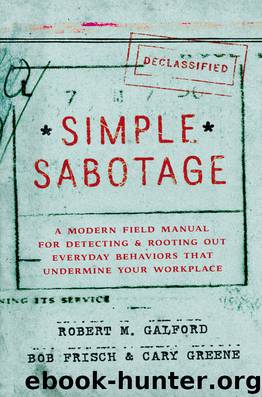Simple Sabotage: A Modern Field Manual for Detecting and Rooting Out Everyday Behaviors That Undermine Your Workplace by Robert M. Galford & Bob Frisch & Cary Greene

Author:Robert M. Galford & Bob Frisch & Cary Greene
Language: eng
Format: mobi, epub
Publisher: HarperCollins
Published: 2015-09-28T14:00:00+00:00
Who Is That in the Mirror?
Spotting sabotage when others commit it is difficult, but spotting sabotage when you are the saboteur is even harder.
It’s almost impossible to spot Sabotage by Irrelevant Issues when the saboteur is looking at you in the mirror. It’s like having a sign taped to your back—you can’t read it. It’s unlikely that after you wrap up an executive management meeting your senior vice president of marketing will clap you on the back and say: “Lousy meeting, Bill. You really can’t stay on topic for more than twenty seconds, can you?”1
So how can you tell when you are an Irrelevant Issues Saboteur?
Get yourself a truth-teller. A consigliere. Someone who can offer direct, honest advice at critical points. Only occasionally will this person come from inside the organization, because your truth-teller’s position and well-being can’t be affected by you in any significant way. For one senior leader at a professional services practice, the truth-teller was the office administrative manager at headquarters. She had been with the firm for a long time; she was nearing retirement; she didn’t have any alliances; she had learned over the years the art of keeping a confidence; and she had watched most of the partners “grow up” from the time they joined as wet-behind-the-ears associates. This person didn’t ask her to be his truth-teller; she had taken the job upon herself, offering him pointed, honest advice at critical points in his career.
Who could yours be? He or she should not be someone in your family or someone who reports directly to you. You can ask anyone who is outside your group, though—anyone who has had significant experience in the area. If you are in a more informal working group, you could tap someone with a good reputation who is close to retirement, or who held your job in the past and is no longer gunning for a promotion. If you work at a high level in a large organization, you might consider engaging your outside counsel. Tell that person that you need him or her to do more than communicate with you through innuendo; you need him or her to be explicit.
Clearly the truth-teller won’t be at all of your meetings. But this person will know your habits. You may not like everything you hear from your truth-teller, but you should listen anyway. It’s like having a personal trainer. Or eating more fiber. Maybe you won’t like the process, but the results are important.
Download
Simple Sabotage: A Modern Field Manual for Detecting and Rooting Out Everyday Behaviors That Undermine Your Workplace by Robert M. Galford & Bob Frisch & Cary Greene.epub
This site does not store any files on its server. We only index and link to content provided by other sites. Please contact the content providers to delete copyright contents if any and email us, we'll remove relevant links or contents immediately.
Rich Dad Poor Dad by Robert T. Kiyosaki(6613)
Bad Blood by John Carreyrou(6611)
Principles: Life and Work by Ray Dalio(6422)
Playing to Win_ How Strategy Really Works by A.G. Lafley & Roger L. Martin(6250)
Management Strategies for the Cloud Revolution: How Cloud Computing Is Transforming Business and Why You Can't Afford to Be Left Behind by Charles Babcock(4567)
The Confidence Code by Katty Kay(4251)
Thinking in Bets by Annie Duke(4218)
American Kingpin by Nick Bilton(3876)
Delivering Happiness by Tony Hsieh(3418)
Project Animal Farm: An Accidental Journey into the Secret World of Farming and the Truth About Our Food by Sonia Faruqi(3213)
The Power of Habit by Charles Duhigg(3129)
The Tyranny of Metrics by Jerry Z. Muller(3065)
The Marketing Plan Handbook: Develop Big-Picture Marketing Plans for Pennies on the Dollar by Robert W. Bly(3057)
Brotopia by Emily Chang(3049)
Mastering Bitcoin: Programming the Open Blockchain by Andreas M. Antonopoulos(3035)
I Live in the Future & Here's How It Works by Nick Bilton(2994)
The Content Trap by Bharat Anand(2917)
Building a StoryBrand by Donald Miller(2896)
Applied Empathy by Michael Ventura(2892)
